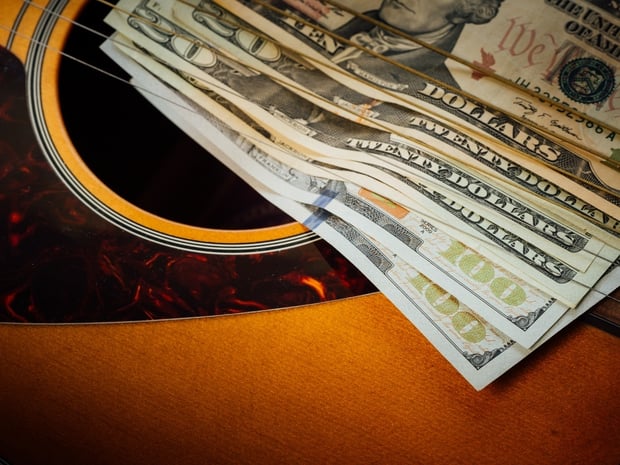
Waiting for your music career to take off is a tough game of patience and perseverance. You've got fans who believe in your work and genuinely want to support you and see you succeed. Maybe you have fans like this all over the world! You might be making some revenue off of your music, but it's not easy to make a living wage as a musician. So, when rent is due, how do you get by? Well, there are several options to make money in music. And trust me, you'll likely have a much better time making your survival job one in the music business, as opposed to grabbing a gig you're not at all passionate about. It will feel real and connect back to your own career as a musician, informing you on aspects of the industry you otherwise wouldn't have known. Here are some good (and usually flexible) gigs you can make a decent amount of money doing until your music covers all the bills. Who knows – you might even discover a new passion!
1. Music journalism
As a passionate musician, chances are that you have no problem talking at length on what you like about a piece of music. Sure, you'll have to leave most of the technical talk out of the picture and instead use more ubiquitous, journalistic language. However, it's still an expressive, music-focused job. You may even have the chance to interview some of your favorite artists and connect with them in a way you might not have been given the opportunity to just as a musician.
Artists (for the most part) love press. While it's not guaranteed you'll make the big bucks right away, music journalism is a great freelance gig for any musician looking to make money in the industry. And from being on the other side of the coin, you may even learn a thing or two about how to do your own press! (Editor's note: If you have some expertise in the music industry, you can apply to be a contributing writer for the Sonicbids blog!)
[9 Things You Might Not Know About Music Journalists]
2. Music photography
This is a more refined skill set to have, but if you have experience taking and editing professional photos, you can freelance for venues, music publications, record labels, and artists. Even if you don't have experience, it's a skill you can likely pick up quickly with your already-in-place creative aptitude from music. Every musician needs high-quality press photos for their EPK. Find work out in your scene, and be open to collaborating in new ways with artists you like.
[3 Things All Musicians Need to Understand About Concert Photography]
3. Work at your local venue(s)
Chances are, your favorite local venue needs another box office person during the busier months. Or maybe they need help with production or security. Your best bet is to try to apply during fall or spring if it's an indoor venue, and summer if an outdoor amphitheater. You might not be doing the most interesting job in the world, but you could be working alongside national acts that come through your town, learning the ups and downs of what it takes to run a smooth show. And hey, you'll earn some extra cash while you're at it!
4. Teaching
This is one of the most obvious moneymaking side jobs for any musician, and chances are you've already done it, are doing it, or have applied to teach. Typically, it's required that you have some type of music education degree, or at least a degree in music. But fear not, if you don't have either, you can teach privately, or find the right studio that understands your musicality is sufficient to teach. If you teach for a studio, you might make a little less, but you'll have a steady flow of work. On the other hand, teaching privately is where you can really start to earn more money. A combination of the two (if the studio allows you to teach outside lessons), and you're on your way to next month's rent! Also, teaching music really keeps you in check as a musician. Most artists find it fulfilling to see their students succeed. Music is a gift – pass it on!
[Should You Teach Music Lessons Independently or Work for a Studio?]
5. Instrument repair
Being an instrument repairman takes a certain skill set, but you've likely already had experience custom-fixing your own instrument to save that expensive Sam Ash trip. If you have those inborn handyman skills, apply them to music! You might need a bit of shadowing at first, but being an instrument repair tech is a great way to make extra money. Plus, you may learn a thing or two about how to make your instrument sound even better!
6. Session or stand-in musician
You've got the chops and the ear – why not lend them to someone else? Being a session musician can be great freelance work. It's competitive, sure, but once you're in, you can prove yourself quickly. Also, being a stand-in musician for other bands is a great way to earn extra money. Maybe you're an upright bass guru – let people hire you to join in on their shows when their guy flakes or just can’t make the part. I know that your own material is where you see yourself truly taking off, but for now, to keep your electric bill paid and still play music, consider lending your skills out to other artists who will surely appreciate them!
[How to Get Hired as a Session Musician]
Sam Friedman is an electronic music producer and singer-songwriter based in Brooklyn, NY. His music blends experimental ambience with indie-driven dance music. In addition to pursuing his own music, he is a New Music Editor for Unrecorded and is passionate about music journalism. Check out his music and follow him on Twitter @nerveleak.


